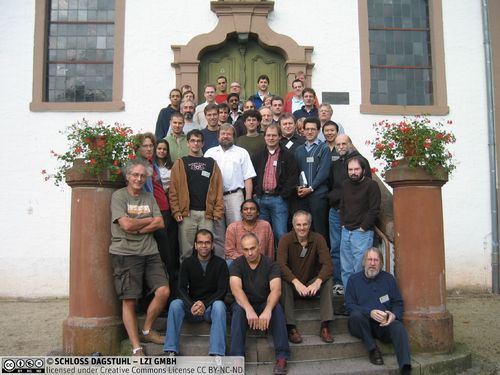Dagstuhl-Seminar 07391
Probabilistic Methods in the Design and Analysis of Algorithms
( 23. Sep – 28. Sep, 2007 )
Permalink
Organisatoren
- Martin Dietzfelbinger (TU Ilmenau, DE)
- Shang-Hua Teng (Boston University, US)
- Eli Upfal (Brown University - Providence, US)
- Berthold Vöcking (RWTH Aachen, DE)
Kontakt
- Annette Beyer (für administrative Fragen)
It is difficult to overstate the importance of probabilistic methods in Theoretical Computer Science. They belong to the most powerful and widely used tools, for example in designing efficient randomized algorithms for tackling hard optimization problems; in establishing various lower bounds in complexity theory; in the proofs of many useful discrete properties in extremal combinatorics; in providing frameworks such as the average-case and smoothed analysis for measuring the performance of algorithms; in the theory of interactive proofs. The body of work using probabilistic methods has experienced an impressive growth in the recent years. The following topics attracted enormous attention both from theorists as well as practitioners during the recent years.
In the area of randomized algorithms, several new probabilistic techniques were developed. For example, there are several exciting recent developments in the probabilistic metric embedding with tree metrics. Because various optimization problems can be solved optimally on trees (e.g., by the dynamic programming approach), quality approximations of arbitrary metrics by tree metrics provide a systematic approach for designing approximation algorithms for general metrics. Further, new techniques for designing randomized data structures were developed that draw on methods from the theory of random graphs and random walks in graphs. A core issue here is the efficient simulation of high-degree randomness without the assumption of the inputs being random.
Probabilistic methods have played an active role in developing analysis frameworks that provide ``practical enough'' measures, yet one can still conduct rigorous analyses using these frameworks. For example, the recently developed smoothed analysis uses small random perturbations for defining performance measures. This framework applies to algorithms whose inputs are subject to slight random noises. The smoothed complexity of an algorithm is then the maximum over its inputs of the expected running time of the algorithm under slight perturbations of that input. Smoothed complexity is measured in terms of the size of the input and the magnitude of the perturbation.
Another area in which random inputs play an important role is stochastic optimization. Here uncertainty in the data is modeled by probability distributions. Stochastic optimization has a wide range of applications in various areas, including logistics, transportation, financial instruments, and network design. In recent years, there has been significant progress in analyzing important algorithms and heuristics used in this field. For example, the sample average approximation (SAA) method solves stochastic programs by sampling from the distribution of input scenarios. Recent theoretical results show that the SAA method has the properties of a fully randomized approximation scheme for a large class of multistage stochastic optimization problems.
The workshop covered recent progress in randomized algorithms and probabilistic measures of algorithms including the smoothed analysis, average-case analysis, semi-random analysis, and stochastic optimization. The presentations covered a large range of optimization problems such as linear programming, integer programming, random games, computational geometry, and scheduling. The most important contribution of the seminar is the exchange of new ideas between researchers using probabilistic methods in different contexts. In addition of providing an opportunity for information sharing and collaborations, the workshop exposed young researchers, students, and postdocs to recent developments and outstanding issues in probabilistic methods.
- Elliot Anshelevich (Rensselaer Polytechnic Institute - Troy, US) [dblp]
- Luca Becchetti (University of Rome "La Sapienza", IT) [dblp]
- Petra Berenbrink (Simon Fraser University - Burnaby, CA) [dblp]
- Shuchi Chawla (University of Wisconsin - Madison, US) [dblp]
- Amin Coja-Oghlan (HU Berlin, DE) [dblp]
- Artur Czumaj (University of Warwick - Coventry, GB) [dblp]
- Luc Devroye (McGill University - Montreal, CA) [dblp]
- Martin Dietzfelbinger (TU Ilmenau, DE) [dblp]
- Benjamin Doerr (MPI für Informatik - Saarbrücken, DE) [dblp]
- Devdatt Dubhashi (Chalmers UT - Göteborg, SE) [dblp]
- Martin Dyer (University of Leeds, GB) [dblp]
- Yuval Emek (Weizmann Institute - Rehovot, IL) [dblp]
- Matthias Englert (RWTH Aachen, DE) [dblp]
- Abraham Flaxman (Microsoft Research - Redmond, US)
- Tom Friedetzky (Durham University, GB) [dblp]
- Alan M. Frieze (Carnegie Mellon University, US) [dblp]
- Andreas Goerdt (TU Chemnitz, DE) [dblp]
- Leslie Ann Goldberg (University of Liverpool, GB) [dblp]
- Paul W. Goldberg (University of Liverpool, GB) [dblp]
- Anupam Gupta (Carnegie Mellon University, US) [dblp]
- Marek Karpinski (Universität Bonn, DE) [dblp]
- Robert Krauthgamer (Weizmann Institute - Rehovot, IL) [dblp]
- Michael Krivelevich (Tel Aviv University, IL) [dblp]
- Bodo Manthey (Universität des Saarlandes, DE) [dblp]
- Frank McSherry (Microsoft Corp. - Mountain View, US) [dblp]
- Ralph Neininger (Universität Frankfurt, DE) [dblp]
- Alessandro Panconesi (Sapienza University of Rome, IT) [dblp]
- Daniel Raible (Universität Trier, DE)
- Heiko Röglin (RWTH Aachen, DE) [dblp]
- Thomas Sauerwald (Universität Paderborn, DE) [dblp]
- David Shmoys (Cornell University, US) [dblp]
- Christian Sohler (Universität Paderborn, DE) [dblp]
- Chaitanya Swamy (University of Waterloo, CA) [dblp]
- Anusch Taraz (TU München, DE)
- Shang-Hua Teng (Boston University, US) [dblp]
- Eli Upfal (Brown University - Providence, US) [dblp]
- Sergei Vassilvitskii (Stanford University, US) [dblp]
- Danny Vilenchik (Tel Aviv University, IL)
- Berthold Vöcking (RWTH Aachen, DE) [dblp]
- Ingo Wegener (TU Dortmund, DE)
- Philipp Woelfel (University of Calgary, CA) [dblp]
Verwandte Seminare
- Dagstuhl-Seminar 17141: Probabilistic Methods in the Design and Analysis of Algorithms (2017-04-02 - 2017-04-07) (Details)
Klassifikation
- Algorithms/Probabilistic Methods/Analysis/Complexity


